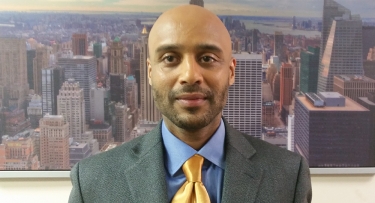Expert Epidemiologist and Mercy Professor Provides Insight into the COVID-19 Vaccine

Here’s a question to consider: How will we end the pandemic?
- Wearing a mask and practicing social distancing
- Washing hands
- Testing and quarantining after exposure or symptoms
- Getting the vaccine
- All of the above
The correct answer is all of the above.
Ending the COVID-19 pandemic requires the use of multiple tools and behaviors, and over the past year many protocols have been universally adopted. But there’s one strategy that, while long-awaited, seems to have some people sitting on the fence: getting the COVID-19 vaccine.
According to the Centers for Disease Control and Prevention, vaccines work with the body’s natural defenses to fight off infection. “The two mRNA vaccines now being distributed are safe, effective, and cannot give you COVID-19,” said Mercy Professor Rossi Hassad, an epidemiologist in the School of Social and Behavioral Sciences.
As a faculty member teaching in-person classes, Hassad was eligible for vaccination, and in January, he received the first shot of the Moderna vaccine at a vaccination site in the Bronx. “The shot itself was painless, and I had the typical mild reaction — some soreness at the injection site and general tiredness for about two days,” he said. He found this reassuring because “my body was responding as expected.”
Yet not everyone feels so confident, largely due to public confusion over information from unreliable sources. The result is what Hassad calls “vaccine hesitancy,” which is the subject of one of his recently published articles. “We need more health education, in the form of consistent, accurate, science-based, targeted messages to address these concerns,” explained Hassad. “Only in this way can we help the public to not only accept the vaccine but also maintain the protective behaviors already adopted.”
Hassad has played an important role in Mercy’s efforts to inform the community about COVID-19. He is a participant in a series called Discussions with Mercy Leaders in the Time of Coronavirus to address issues related to the pandemic. In addition, he has been widely quoted in the media, sharing his expertise through print, television, and social media channels, and fielding questions from the public on a recurring Facebook livestream hosted by the News12 TV network.
With the vaccine becoming more widely available, educating the public is vital, said Hassad: “Knowledge does not equate to behavioral change. Beliefs can be potent and a strong barrier to the adoption of practices necessary to end the pandemic.” He added that Mercy has been helpful in providing documentation and support for navigating the tedious process of registering and establishing eligibility for vaccination.
The Student Health Office at Mercy College provides information to help students, faculty and staff determine vaccine eligibility and make appointments to receive the vaccine. Frequently Asked Questions can be found here.
So, how does Hassad feel after having received the first shot of the COVID-19 vaccine?
“It’s a huge relief,” said Hassad. “I’m very thankful that I was able to receive the vaccine so early, and for the support I received from Mercy College. I strongly encourage anyone who meets the eligibility requirement to get the vaccine as soon as possible.”
